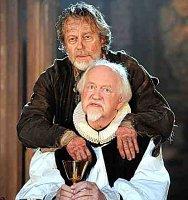Written on the Heart
Last year saw the 400th anniversary of the King James Bible (KJB, for brevity). That event was celebrated at Shakespeare's Globe with 'The Word Is God' season. Later in the year, the RSC also found time to celebrate the event with this play written by David Edgar, which arose out of a conference on the 'impact and legacy' of the KJB held back in 2008, and which has now transferred for a London run.
'Written on the Heart' provides some of the historical perspective on the development of the KJB, its precursors and those who were involved in its creation. It is a story of politics and power which began even before Henry VIII abandoned the Catholic Church in order to secure his divorce from Catherine of Aragon so he could remarry and get himself an heir. When James I became King of England in 1603, times and the religious climate had changed significantly, and James decided only a year into his reign to sponsor a grand project to write a new version of the bible in English - though churches up and down the country were arm-twisted into paying for it!
'Written on the Heart' starts with a meeting of some of the learned men who were entrusted with the creation of the KJB. It is 1610 and though much of the work has been done there are some outstanding edits which need consideration. It turns out that these really boil down to the odd word or two which, for the most part, seem insignificant to anyone other than the King and the clergy. Next, we turn to Flanders in 1536 where William Tyndale is awaiting his execution in prison. Tyndale was the first to make a translation of the bible into English which ended-up in print. But this did not go down well with the clergy who saw their living at risk if anyone could read the word of God in their own tongue. Next, were are whisked-off to Yorkshire. It is 50 years later and Elizabeth is now on the throne of England and she has gone some way to reconcile catholics and protestants, though there are significant controls on churches and what can be done in them. Then it is back to 1610 and William Tyndale's ghost arrives to discourse on the new bible with the Bishop of Ely, Lancelot Andrews, who oversaw the KJB project and is the central character in the pieice.
Gregory Doran's presentation is admirable enough and David Edgar's play is intelligently written and has worked hard to make sense of the KJB story, but one feels the contract was too large. The backstory alone here is enough to require a degree in theology, history or divinity, or all three. That may be a slight exaggeration, but I have to admit that, by the middle of the second half, I found my ability to concentrate weakening significantly. There is little action in the play and relatively little humour to break-up the discourse which, I'm afraid, does border on the tedious at times. However, it is a pleasure to see Oliver Ford Davies back in fine form as Andrewes, and Stephen boxer proves intellectually passionate as the doomed Tyndale.
If you have a particular interest in the King James Bible, or bibles in general, this may be your kind of play. But if you only have a passing interest in religion or history, this could be taxing.
(Peter Brown)
"David Edgar has come up with a learned, information-packed and engrossing play."
Michael Billington for The Guardian
"Though the director, Gregory Doran, has come up with a brisk production, he cannot disguise the fact that the play is dry and verbose, and I fear its analysis of the English Reformation will seem arcane and irrelevant to many in our present secular age."
Charles Spencer for the Daily Telegraph
"powerfully involving and pungently acted production."
Paul Taylor for The Independent
External links to full reviews from popular press
The Guardian - Telegraph - Independent -
Originally published on
